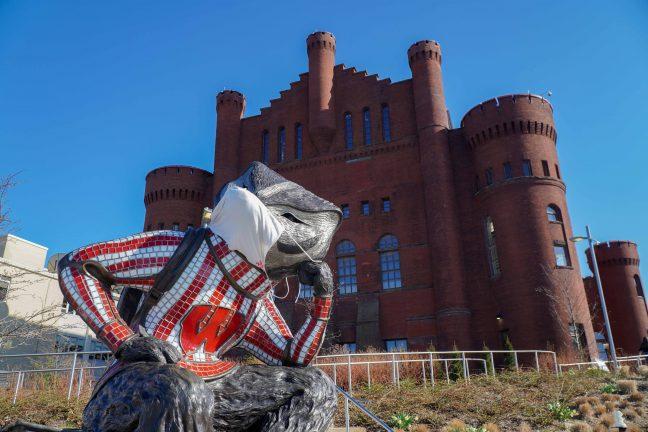The University of Wisconsin announced a change to the campus events policy which will now allow up to 50 people to gather indoors and up to 150 people to gather outdoors.
The university announced the new policy March 3 and put it in effect March 8, with a few stipulations such as maintaining the six feet of physical distance requirement at all times as well as continuing the mask mandate for both indoor and outdoor events. Students will still need to show a green “Building Access Granted” status on the Safer Badgers app before attending events and no guests, visitors, food or drinks will be allowed at events.
The university still recommends student organizations continue to host events online whenever possible.
Public Health Madison & Dane County offers possible explanations for decrease in UW COVID-19 cases
Director of News and Media Relations for UW Meredith McGlone said the restrictions on gatherings were loosened due to a lower prevalence of COVID-19 on campus, as well as guidance from University Health Services and Public Health Madison and Dane County’s new public health order allowing an increase in gathering capacities.
McGlone also said she hopes more in-person activities will resume as more people become fully vaccinated on campus.
Expert on modeling infectious disease and UW School of Medicine and Public Health professor Oguzhan Alagoz spoke to the potential risks associated with the new campus events policy.
“I’m glad I’m not the one who makes these policy decisions. I can’t tell you if it’s a good decision or a bad one,” Alagoz said. “Every additional relaxation [of COVID-19 safety protocols] increases the risk of transmission. The numbers have dropped significantly, but we’re not out of the woods yet. The policy will absolutely have a negative effect on the number of cases, but the magnitude of the effect will not be huge in my opinion because now we have major vaccinations in progress.”
GOP lawmakers create resolution to terminate statewide mask mandate
Alagoz also said campus policymakers were tasked with assessing the risks associated with loosening restrictions and likely decided a slight relaxation of gathering rules would not dramatically increase cases, especially considering the high rates of immunity among high-risk populations due to vaccination progress.
Alagoz said he believes non-invasive precautions, like mask wearing, should still be enforced despite the downward trend in cases.
“All of our predictions and assumptions are based on the original strain of COVID-19, but now there are new variants which could totally change the equation,” Alagoz said. “The longer the virus stays around, the higher the risk of a new variant popping up. Any policy that completely lifts all restrictions is dangerous for all of us.”
Wisconsin Partnership Program awards $6 million through annual grant program
Professor Dominique Brossard, an expert in risk communication and Chair of the University of Wisconsin Department of Life Sciences Communication, expressed optimism that loosening restrictions at campus events could prove to be a promising sign for the future.
Brossard believes collaboration among student organizations and UW faculty is a key aspect of moving forward with the new policy on gatherings.
“There is a very clear pandemic fatigue, but the vaccine and decreasing number of cases are starting to give people hope,” Brossard said. “A policy that sets the stage to slowly but surely return to normal makes sense and sends the message that we’re not out of the tunnel yet. Rather than focusing on enforcement [of the campus events policy], we need to encourage a healthy dialogue between students and faculty.”
UNC epidemiologist speaks on guiding COVID-19 research principles
Vice President of Membership at UW business fraternity Alpha Kappa Psi Suzy Dawood expressed her excitement that the new campus events policy will allow her organization to start hosting events again.
Dawood said AKPsi is in no rush to return to business as usual, however. Rather, she said her organization plans to take the conservative approach of easing back to in-person events while keeping the majority of chapter activity online.
“Going from 25 to 150 people seemed like a pretty big jump, but I think the increased testing on campus gives campus officials more confidence to allow larger gatherings,” Dawood said. “For an organization like us with a little under 200 members, we still can’t gather all at once. For the time being, we’re proceeding mostly online, but it is exciting to be able to safely gather and host some outdoor events.”
UW South Asian organizations raise awareness, funds for Punjab farmers’ protests in India
The relaxation of gathering restrictions does not apply to sports clubs registered through University Recreation and Wellbeing. For organizations like the UW-Madison Rugby Club, receiving approval to start practicing again required an extensive back-and-forth between club president Alexander Evans and RecWell.
“Early on there was a possibility for off-campus practices,” Evans said. “I did some research on potential field spaces, put in a down payment and submitted a form, but the university rejected the proposal due to a huge spike of COVID-19 cases on campus.”
Currently, sports clubs may host practices at the Nicholas Recreation Center with no more than 10 people, so long as the practice is supervised by a RecWell employee who checks each participant’s Badger Badge. Starting in March, clubs may also host practices with up to 25 people at the Near West Fields.
“I think the university has done a good job keeping everyone safe,” Evans said. “It’s natural to be frustrated due to the ever-changing nature of the pandemic.”
























